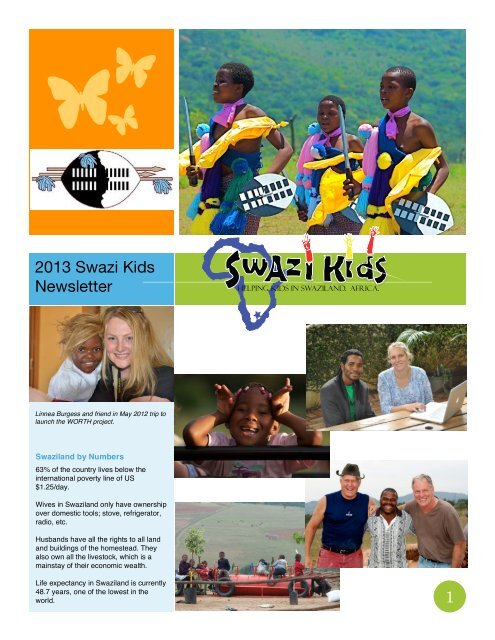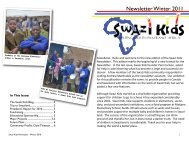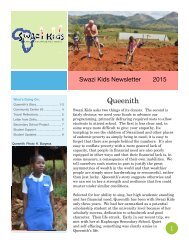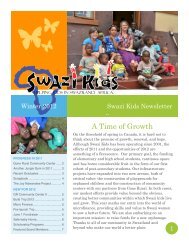2013 Swazi Kids Newsletter
You also want an ePaper? Increase the reach of your titles
YUMPU automatically turns print PDFs into web optimized ePapers that Google loves.
<strong>2013</strong> <strong>Swazi</strong> <strong>Kids</strong><br />
<strong>Newsletter</strong><br />
!"#$%&'()%*+(%&(+,-.%#-&*/((-01%2-/((<br />
!345678()69:(67(+;
<strong>Swazi</strong> <strong>Kids</strong> <strong>Newsletter</strong> <strong>2013</strong><br />
The WORTH Project in<br />
Partnership with PACT<br />
Six women from Canada travelled to <strong>Swazi</strong>land in May<br />
2012 to gather information and oversee the<br />
implementation of this project. The project starts with 11<br />
groups of 25 women each with plans to expand to 25<br />
groups. Thanks to Jane Lister, Annette Sharkey, Karin,<br />
Emma, Linnea Burgess. In addition to the WORTH<br />
project, the team inspected all aspects of <strong>Swazi</strong> <strong>Kids</strong><br />
operations. Karin Burgess is our tireless photographer<br />
and Emma Burgess designed and maintains our web page.<br />
(www.swazikids.org). Check out the details of the trip and<br />
the project on the blog (www.swazikids.wordpress.org).<br />
2<br />
In May 2012, <strong>Swazi</strong> <strong>Kids</strong> launched its<br />
much-anticipated effort into village banking.<br />
The goal of this project is to provide basic<br />
financial literacy to people who otherwise<br />
lack access to banking and credit.<br />
Interestingly, microfinance has a deep<br />
history that includes foundational forms in<br />
15 th century Europe that helped create the<br />
modern market economy.<br />
Its modern form was pioneered by<br />
Bangladeshi economist Muhammad Yunus,<br />
who won the Nobel Peace Prize for his effort<br />
to provide banking and credit to people too<br />
poor to qualify for traditional loans. (Check<br />
out his book, “Banker to the Poor”). The<br />
model is simple: people are poor in part<br />
because of their circumstances not their<br />
abilities. We are working with PACT<br />
(www.pactworld.org) an international NGO<br />
that developed the WORTH program. This<br />
teaches financial literacy to groups of<br />
women already working together in lending,<br />
borrowing and entrepreneurial skills<br />
training. No money is actually lent to the<br />
women, the program’s costs are in the<br />
training and mentoring, with the women<br />
lending and borrowing their own<br />
funds. This is a very important distinction<br />
from “microfinance”.<br />
Since this is a complex endeavor, <strong>Swazi</strong><br />
<strong>Kids</strong> chose to bring village literacy to<br />
<strong>Swazi</strong>land via an established partner and<br />
with a proven program. PACT pioneered its<br />
WORTH lending and saving project directed<br />
primarily at women in Nepal in 1999. Today,<br />
WORTH operates with partner NGOs in<br />
many countries. WORTH encourages small<br />
partnerships of up to 25 women to establish<br />
village banks, provide basic financial services,<br />
and generate income, develop financial<br />
competence, and generate social, economic,<br />
and community independence. <strong>Swazi</strong> <strong>Kids</strong><br />
has partnered with the Gone Rural boMake<br />
(www.goneruralswazi.com) cooperative to<br />
bring the WORTH project to 275 women in 11<br />
communities. WORTH is building on the<br />
existing strengths of Gone Rural to provide<br />
peer-led business training and economic<br />
empowerment.<br />
Gone Rural boMake is a fully<br />
transparent, account-able, and audited<br />
organization. This is the fourth partnership<br />
between <strong>Swazi</strong> <strong>Kids</strong> and Gone Rural boMake.
<strong>Swazi</strong> <strong>Kids</strong> <strong>Newsletter</strong> <strong>2013</strong><br />
3<br />
Gone Rural boMake Development Project.<br />
In 2011, <strong>Swazi</strong> <strong>Kids</strong> embarked upon a<br />
new construction project, the building of<br />
community centers for the Gone Rural<br />
women’s cooperative. The first of these was<br />
opened in the Lamghabi region on December<br />
1, 2011. <strong>Swazi</strong> <strong>Kids</strong> is very pleased to<br />
announce that construction of a second<br />
community center began in Emdlangwe in<br />
December 2012.<br />
The Gone Rural cooperative is, by<br />
definition, a profit making enterprise,<br />
although one that maintains principles of fair<br />
trade and sustainability. It supports<br />
hundreds of women directly through its<br />
cooperative operations that provide<br />
production guidance and collective marketing<br />
for a wide range of woven and ceramic<br />
products manufactured using traditional<br />
hand-made techniques. The Gone Rural<br />
project started with 30 women and has grown<br />
into an international company of 731 rural<br />
women whose goods are sold in over 32<br />
countries worldwide. Income from their work<br />
allows women of the Gone Rural cooperative<br />
to support their families and communities<br />
throughout <strong>Swazi</strong>land.<br />
In order to expand its focus from trade<br />
to community support, the cooperative<br />
founded a non-profit organization, Gone<br />
Rural boMake (www.goneruralswazi.com) in<br />
2006. BoMake, which means “many<br />
mothers,” focuses on supporting local<br />
communities through education (funding for<br />
280 students), health (education outreach and<br />
a mobile clinic), community development<br />
(water infrastructure and housing) and<br />
women’s empowerment (the Joy Project).<br />
Many of boMake’s goals and projects align<br />
with those of <strong>Swazi</strong> <strong>Kids</strong> and we have<br />
partnered with them on the Joy Project and<br />
on the construction of community centers. As
<strong>Swazi</strong> <strong>Kids</strong> <strong>Newsletter</strong> <strong>2013</strong><br />
with the Lamghabi project, this<br />
community center will house the<br />
work of the Gone Rural cooperative<br />
and the community support programs<br />
of Gone Rural boMake.<br />
The Emdlangwe project was<br />
funded by Judith and Heather<br />
Bisiker. Special thanks to Judith and<br />
Heather Bisiker, Amy and Emily<br />
Dunning (center photo at left),<br />
Barbara Melymick, Brian and<br />
Berneice Piwek and Bruce, Jeremy<br />
and Thula Carlson for their moral<br />
support, participation and hard work<br />
at Emdlangwe.<br />
As described in a blog entry<br />
(www.swazikids.wordpress.org), the<br />
construction project was designed to<br />
be a synthesis of modern engineering<br />
and traditional earth-block<br />
construction. Funds were used to<br />
train a building team on the<br />
principles of earth-block construction,<br />
skills that the team then passed on to<br />
the construction crew and<br />
community. A total of 2300 earth<br />
blocks were manufactured and stored<br />
in October 2012. The <strong>Swazi</strong> <strong>Kids</strong><br />
team arrived on October 8 and the<br />
building was constructed and roofed<br />
quickly. In December, a violent<br />
windstorm ripped the roof off the<br />
building, leaving the earth-block<br />
construction vulnerable to the<br />
elements. This event delayed<br />
construction and pushed costs beyond<br />
the budget. Fortunately, Brian and<br />
Bernice Piwek stepped in and funded<br />
a new roof made of higher-grade<br />
aluminum, a design feature that we<br />
will include in future building<br />
projects.<br />
4
<strong>Swazi</strong> <strong>Kids</strong> <strong>Newsletter</strong> <strong>2013</strong><br />
Student Support Program<br />
Student support was the founding purpose of <strong>Swazi</strong> <strong>Kids</strong> and remains a cornerstone of our<br />
efforts. As illustrated in the chart below, the total number of students supported continues to<br />
grow as does the progress of students through the grades. In 2012, we saw the largest number<br />
of high school<br />
50<br />
graduates in our<br />
program, 4 boys 40<br />
and 3 girls from<br />
Elementary<br />
30<br />
4 different<br />
Secondary<br />
schools. We are 20<br />
Post-Secondary<br />
committed to<br />
10<br />
High School Grads<br />
supporting<br />
students to the 0<br />
2002 2003 2004 2005 2006 2007 2008 2009 2010 2011 2012<br />
completion of<br />
high school and into post-secondary. Due to the enormous support from one family, we are<br />
able to offer full or partial scholarships to an increasing number of university and college<br />
students, a total of 14 in 2012 and 18 in <strong>2013</strong>. These gifted students cover a wide range of<br />
fields including nursing, pre-med sciences, electrical, civil engineering, teachers college,<br />
business and office skills, and accounting/book-keeping. Many of our supporters direct their<br />
assistance specifically to the education program and are able to support the same students<br />
throughout their education.<br />
5<br />
Mentors Joseph and<br />
Cynthia<br />
We continue to be indebted to our<br />
employees, Pastor Joseph and<br />
Cynthia Aryee. Joe and Cynthia are<br />
originally from Ghana but have<br />
called <strong>Swazi</strong>land home for over 10<br />
years. They have three delightful<br />
boys. In addition to being a pastor<br />
and working for <strong>Swazi</strong> <strong>Kids</strong>, Joe is a<br />
full-time science teacher at St.<br />
Michael’s private school in Manzini.
<strong>Swazi</strong> <strong>Kids</strong> <strong>Newsletter</strong> <strong>2013</strong><br />
Four More<br />
Jungle Gyms<br />
In 2012<br />
In 2010 we initiated a project to install playground<br />
apparatuses for children at the Manzini half-way house. In<br />
2011 we constructed a second playground at a facility in<br />
Mbabane. This year we expanded the program and built 4<br />
structures at the two community center locations in<br />
Lamghabi and Emdlangwe. We were able to do so in part due<br />
to the tremendous efforts of 11 year-old Jeanah Gunn (photo<br />
at left), herself a <strong>Swazi</strong>-Canadian. Jeanah single handedly<br />
raised $1500 by speaking to elementary and middle schools<br />
on 8 different occasions to bring awareness of the challenges<br />
facing Africa in general and <strong>Swazi</strong>land in particular to<br />
children in her town of Salmon Arm, BC. Jeanah’s funding<br />
paid for 2 of the playground structures.<br />
Judith mixes lime by hand.<br />
6
<strong>Swazi</strong> <strong>Kids</strong> <strong>Newsletter</strong> <strong>2013</strong><br />
7<br />
Upcoming for <strong>2013</strong><br />
2012 was a busy year with 2 trips and so many projects initiated. As we look ahead to <strong>2013</strong>,<br />
<strong>Swazi</strong><strong>Kids</strong> is planning less expansion and focusing on maintaining and developing existing<br />
programs. We remain committed to helping children complete their education as this is the<br />
single most effective way to improve their lives. We are also excited about our continuing<br />
collaboration with the Gone Rural cooperative and its boMake project through the WORTH<br />
project (financial literacy) and the Community Development Project (construction of<br />
community centers).<br />
In <strong>2013</strong>, the Carlsons are moving from Vernon to Kelowna for increased work<br />
opportunities for Pam. After a 12 year hiatus from full time work, she is re-entering<br />
chiropractic practice and beginning all over a brand new business, as such her energies for<br />
<strong>Swazi</strong> <strong>Kids</strong> are more limited than the past growth years of <strong>Swazi</strong> <strong>Kids</strong>. Thanks to all of you<br />
for your continued support, both moral and financial.
Featured Sponsors<br />
<strong>Swazi</strong> <strong>Kids</strong> held a successful fundraiser <br />
in June of 2012 at the UBC Boathouse. <br />
Featuring live music and live and silent <br />
auctions, $7000 was raised and an <br />
additional $5000 was pledged. Special <br />
thanks to Roy and Maureen Mcintosh <br />
(photo at right) for donating a one week <br />
holiday at their wonderful waterfront <br />
home in Cabo San Lucas at the <br />
southern tip of the Baja California <br />
peninsula in Mexico. The holiday <br />
included use of a boat (with a captain) <br />
with all proceeds donated to <strong>Swazi</strong> <br />
<strong>Kids</strong>. Thanks to all who came out and <br />
supported our programs. <br />
<strong>Swazi</strong> <strong>Kids</strong> <strong>Newsletter</strong>. Editors: A. Martindale & P. Carlson <strong>2013</strong><br />
<strong>Swazi</strong> <strong>Kids</strong><br />
Works<br />
Our ongoing efforts to improve the lives of children<br />
in <strong>Swazi</strong>land require significant funds. We thank all<br />
of you who so generously donate to our projects.<br />
Donations to specific projects are welcomed:<br />
- Community Center #3<br />
- Elementary Student ($200/year)<br />
- High School Student ($500/year)<br />
- School Uniform ($75)<br />
- Medical/dental care for orphans<br />
Send a cheque payable to <strong>Swazi</strong> <strong>Kids</strong> or visit<br />
www.swazikids.org to donate online.<br />
swazikids@shaw.ca<br />
<strong>Swazi</strong> <strong>Kids</strong> Society<br />
280 Kalamalka Lakeview Dr<br />
Vernon, BC V1H 1G1 Canada






